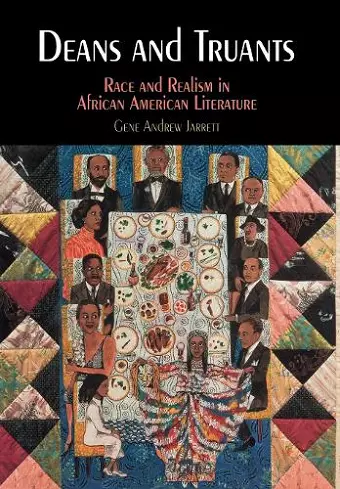Deans and Truants
Race and Realism in African American Literature
Format:Hardback
Publisher:University of Pennsylvania Press
Published:10th Jan '07
Currently unavailable, and unfortunately no date known when it will be back

For a work to be considered African American literature, does it need to focus on African American characters? Or is it enough for the author to be identified as African American? Jarrett traces the shifting definitions of African American literature and the authors who wrote beyond those boundaries at the cost of critical dismissal or obscurity.
For a work to be considered African American literature, does it need to focus on black characters or political themes? Must it represent these within a specific stylistic range? Or is it enough for the author to be identified as African American? In Deans and Truants, Gene Andrew Jarrett traces the shifting definitions of African American literature and the authors who wrote beyond those boundaries at the cost of critical dismissal and, at times, obscurity. From the late nineteenth century to the end of the twentieth, de facto deans—critics and authors as different as William Howells, Alain Locke, Richard Wright, and Amiri Baraka—prescribed the shifting parameters of realism and racial subject matter appropriate to authentic African American literature, while truant authors such as Paul Laurence Dunbar, George S. Schuyler, Frank Yerby, and Toni Morrison—perhaps the most celebrated African American author of the twentieth century—wrote literature anomalous to those standards.
Jarrett explores the issues at stake when Howells, the "Dean of American Letters," argues in 1896 that only Dunbar's "entirely black verse," written in dialect, "would succeed." Three decades later, Locke, the cultural arbiter of the Harlem Renaissance, stands in contrast to Schuyler, a journalist and novelist who questions the existence of a peculiarly black or "New Negro" art. Next, Wright's 1937 blueprint for African American writing sets the terms of the Chicago Renaissance, but Yerby's version of historical romance approaches race and realism in alternative literary ways. Finally, Deans and Truants measures the gravitational pull of the late 1960s Black Aesthetic in Baraka's editorial silence on Toni Morrison's first and only short story, "Recitatif."
Drawing from a wealth of biographical, historical, and literary sources, Deans and Truants describes the changing notions of race, politics, and gender that framed and were framed by the authors and critics of African American culture for more than a century.
"Deans and Truants: Race and Realism in African American Literature is a richly textured study of theoretical conceptions of the African American canon as well as primary and secondary sources." * American Literature *
"In Deans and Truants Gene Jarrett has inaugurated an entirely new approach to the subject of canon-formation in African American literature, insisting that we expand our definition of the tradition to include black authors who chose not to write about race and who, consequently, have often found their works uncollected and unanalyzed, if not severely critiqued. Jarrett's cogent and compelling argument is sure to generate debate and, ultimately, lead to a reconsideration of what, exactly, is 'African American' about African American literature. This is a very important book and marks the inaugural intervention of one of the major scholars and critics of African American literature of a new generation." * Henry Louis Gates, Jr., Harvard University *
"While challenging the standard notion of black literature, this readable, engaging work also provides insightful analyses of such understudied works as Morrison's short story 'Recitatif,' Yerby's historical novel The Foxes of Harrow, and Schuyler's satirical novel Black No More." * Choice *
"Selecting a wide range of writing, poetry, novels, short stories, satire, and criticism, Jarrett shows how the reception of certain authors and their texts has defined what is and is not considered African American literature to this day. . . . This book is well written and as nicely nuanced as the topic it addresses." * Journal of American Studies *
ISBN: 9780812239737
Dimensions: unknown
Weight: unknown
232 pages